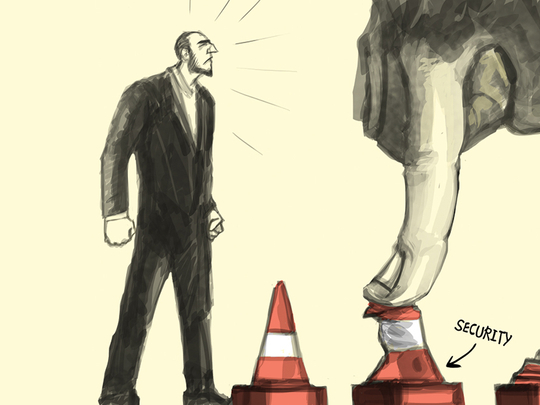
The Middle East seems to be sliding more into chaos and mayhem, spiralling out of control in a free-fall with consequential ramifications. I hate to keep repeating it, I was right, when I predicted that 2015 would be a much worse year than 2014, as 2014 was similarly worse than 2013.
Are we doomed to live in a region where our fate and well-being is tested; and every year we hope to have reached the bottom, to be shocked that we are in a bottomless pit?
In 2015 the Arabs got their act together under the Saudi stewardship by launching operation Decisive Storm after much US wavering, to act independently and to form a wide coalition and lead it to not only restore legitimacy in Yemen, but to arrest and contain Iran’s expansionist designs and hegemonic project.
The year 2015 is shaping up to be even worse than 2014. The Arab order continues to spiral out of control. The Arab states continue to contract and the non-state actors seem to be gaining the upper hand.
The traditional Arab states seem to be embroiled in domestic strife, fragmented and distracted. These states can’t be counted upon to play a deterring or stabilising role in regional order. This leaves the GCC states as the only player to carry the baton of the Arab order. The Saudi Arabia-led Decisive Storm confirms the stature of Saudi Arabia and its GCC partners as the de facto leader of the Arab order. Today there is serious talk of a “Saudi Arabia defence doctrine”.
The GCC states since 2013 have shown displeasure over the US’s Middle East policy vis-a-vis Iran, Iraq, Syria and the Arab Spring. The Camp David Summit in May this year hosted by US President Barack Obama to allay GCC fears, in addition to the strategic fifth GCC-US Strategic Cooperation Forum last month, have done little to alleviate the security dilemma of the GCC states. These GCC allies feel they are being underappreciated and their fears and security concerns not addressed.
This year too, the US continues to be missing in action. The Obama administration’s obsession to reach a nuclear deal with Iran at any cost, has unravelled the region and convinced Iran it could get away with much more than it was used to.
The GCC states supported the nuclear deal at the Camp David Summit, provided it stopped Iran’s nuclear programme and moderated its behaviour towards its GCC neighbours. The hope was that the nuclear deal would deliver results and more opportunities than challenges and build more bridges and fewer walls, resulting in confidence-building measures and make Iran embark on good neighbourly relations with GCC members. But apparently, that was an idealistic dream that is unlikely to materialise. To the dismay of the GCC, the US has remained silent over Iran’s interventions and destabilising tactics that have witnessed an uptick since the signing of the nuclear deal. Iran seems to have been emboldened and is acting with more confidence and impunity.
Our deepest fear in the GCC states after the Iran nuclear deal has been confirmed. Iran won’t change its colours. On the contrary, Iran is acting as we have suspected; irrationally, bombastic, arrogant and with bravado and in a much bolder way than its behaviour was before the nuclear deal was reached. If this behaviour is left unchecked and undeterred, it will undermine and destabilise the Gulf region and endanger GCC security and stability.
American reticence
The discovery of terrorist cells trained, armed and guided by Iran in Kuwait and Bahrain, is an ominous development and does not bode well for future relations between the GCC states and Iran in the post-nuclear-deal era. Then there was the Iranian meddling in the Haj in Saudi Arabia — Iran was the only Muslim country to blame Saudi mismanagement and ineptitude for the Mina stampede that resulted in the deaths of around 800 pilgrims.
It is disheartening and disappointing that the US has remained reticent and not uttered any comment or condemned Iran’s bullying and destabilising tactics.
This GCC, especially from the Saudi perspective, has launched Decisive Storm independent of US tutelage. Saudi Arabia, with its GCC partners and other Arab and Muslim states, have changed the status quo of the region by launching the operation against Al Houthi rebels — Iran’s surrogates in Yemen. But the strategic objective of the operation is to roll back Iran’s gains and to check, contain and deter Iran’s expansionist crescent that has circled Saudi Arabia and other GCC states from all sides, including the Straits of Hormuz on the Arabian Gulf and the Straits of Bab Al Mandab — the access to the Red Sea.
The Russian return to the Middle East after more than four decades of their departure after the former Egyptian president Anwar Sadat pushed them out of the Middle East, marks a watershed moment and is a sign of how it is benefiting from US’ policy of dithering and wavering in the region.
Senator John McCain has described US policy in the Middle East as “wreckage”. He criticised the Obama administration for “leading from behind” and criticised its Middle East policy, describing it as “confusing our friends and encouraging our enemies”.
Professor Abdullah Al Shayji is former chairman of the political science department at Kuwait University. He is currently a visiting scholar at the Middle East Centre in George Washington University. You can follow him at twitter.com/@docshayji.









